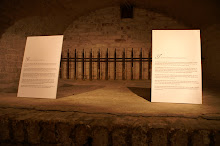‘It is essential we look after the land,’ you told them. ‘Our numbers are grown so great; we must manage the resources we have.’
They did not listen. ‘So much of our food must be imported,’ they said. ‘Our farmers must grow more. What if Greece should go to war?’
You tried to make them understand. You told them how in 5000BC the first settlers were wise, selecting only fertile areas; how time passed and through forgetfulness and necessity, the communities expanded onto the fragile slopes.
‘Look around,’ you said. ‘Like the skeleton of a sick man, the hills of Attica are stripped bare. All of Greece is like this. The trees are gone and the soil washes away. We must manage the land as Xenphon taught us.’
Solon, the great reformer, understood, passing laws to ban hillside ploughing. But when Peisistratus came to power he reversed the order, bringing more and more land into use.
It gave you no pleasure to have your predictions come true, to see productivity decline and Greece’s power wane. The Peloponnesian War marked the end of a great era, but the land continued to suffer. Now it is estimated nearly a third of the country is just one step from becoming desert.
skip to main |
skip to sidebar







According to the UNFPA the population of the world increases by 1.2% a year.
That's 235,000 a day.
That's 235,000 a day.
GENE MEME is a blog, art installation and outreach programme about world population.
The GENE MEME art installation took place in the Crypt Gallery in London from 9 June to 20 June 2010.
The GENE MEME art installation took place in the Crypt Gallery in London from 9 June to 20 June 2010.
GENE MEME was supported by a debate asking what should be done about rising population.



Links to posts
- Ancestral Pueblo culture
- Angkor
- Antioch
- Bodmin Moor
- Cahokia
- China’s Great Leap Forward
- Classical Greece
- Easter Island
- Ephesus
- Fatehpur Sikri
- GENE MEME
- Hawaii
- Hispaniola
- Holodomor
- Illinois
- Juana Maria
- Kaskaskia
- Madagascar
- Minimata
- North Korea’s ‘Arduous March’
- Pitcairn Island
- Rabbits in Australia
- Rwanda
- Smallpox
- St Kilda
- St Matthew Island
- Sugar
- The Aleuts
- The American Dustbowl
- The ancient Olmec civilisation
- The Aral Sea
- The burial of Riez
- The collapse of the Nasca
- The decline of Bruges
- The deforestation of Ethiopia
- The extinction of the Moa
- The Florida Everglades
- The Gambier trade triangle
- The great civilisation of Sumer
- The Harappan Culture
- The Irish potato famine
- the last Nicoleňo
- The last passenger pigeon
- The Mayan civilisation
- The pleistocene extinctions
- The Sahel
- The Vikings in Greenland
Search This Blog

